
Once you have opened a Maxima session, load package draw:
load("draw") $
To read the documentation on object label, write the following sentence:
describe(label) $
Label in 2D plots:
draw2d(
yrange = [0.1,1.4],
color = red,
label(["Label in red",0,0.3]),
color = "#0000ff",
label(["Label in blue",0,0.6]),
color = light_blue,
label(["Label in light-blue",0,0.9],
["Another light-blue",0,1.2]) )$

Label in 3D plots:
draw3d( surface_hide = true, explicit(exp(sin(x)+cos(x^2))-2,x,-3,3,y,-3,3), color = red, label(["UP 1",-2,0,3], ["UP 2",1.5,0,4]), color = blue, label(["DOWN 1",2,0,-3]) )$
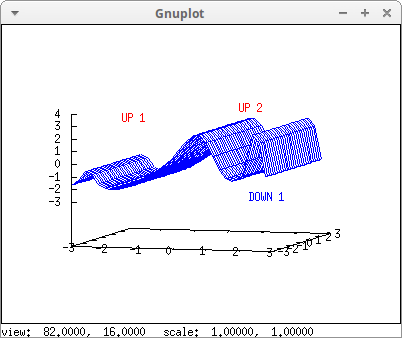
Playing with font type and size in x11 terminal:
draw2d(
explicit(x^2,x,-1,1),
grid = true,
font = "Arial",
font_size = 20,
color = red,
label(["Parabola",0,0.3]) )$
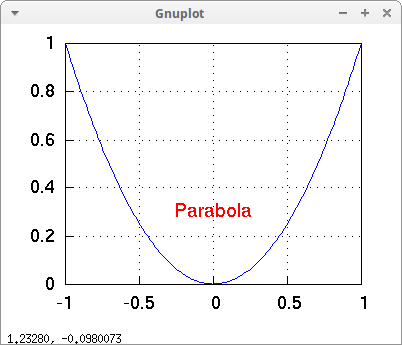
Playing with font type and size in PNG terminal:
draw2d(
terminal = png,
explicit(x^2,x,-1,1),
grid = true,
font = "/usr/share/fonts/truetype/freefont/FreeSerifBoldItalic.ttf",
font_size = 20,
color = red,
label(["Parabola",0,0.3]) )$
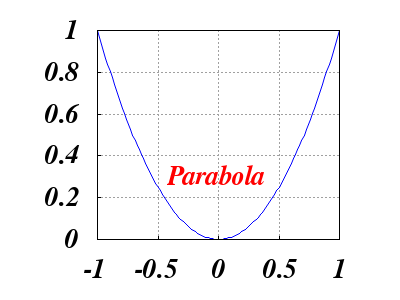
Playing with font type and size in Postscript terminal:
draw2d(
terminal = eps_color,
dimensions = 100*[10,10],
explicit(x^2,x,-1,1),
grid = true,
font = "Courier-Oblique",
font_size = 20,
color = red,
label(["Parabola",0,0.3]) )$
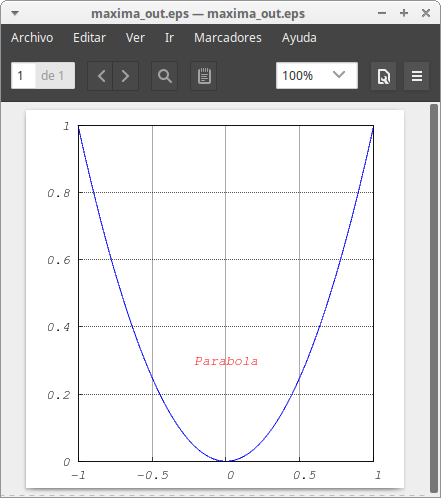
It's possible to write greek letters and some basic mathematical symbols in labels and titles. The syntax to be used is described here:
draw2d(
dimensions = 100*[12, 8], /* 12 cm x 8 cm */
filled_func = 0,
fill_color = cyan,
explicit(x^2-x+5, x, 1, 4),
filled_func = false,
explicit(x^2-x+5, x, -1, 5),
color = black,
label_alignment = left,
label(["f(x) = ({/Symbol a} x^2 + {/Symbol b} x +{/Symbol g})", 1.1, 22],
["A = {/Symbol=30 \\362@_{/=9.6 1}^{/=12 4}} f(x) d x",1.1,19]),
yrange = [-1,30],
grid = true,
terminal = eps_color ) $
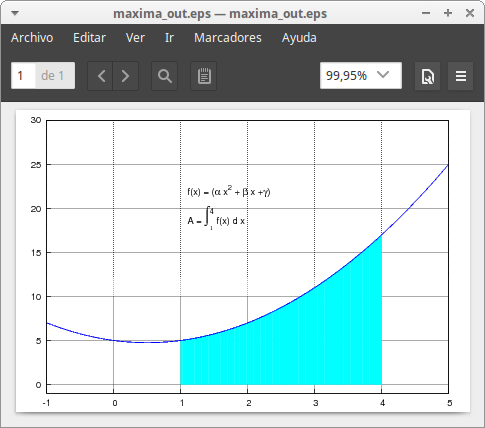
Gif animation with greek characters:
set_draw_defaults(
xrange = [1,2.5],
yrange = [1,3],
label_alignment = left )$
greek_word:
["{/Symbol P} ",
"{/Symbol u} ",
"{/Symbol t} ",
"{/Symbol a} ",
"{/Symbol g} ",
"{/Symbol o} ",
"{/Symbol r} ",
"{/Symbol a} ",
"{/Symbol s} "] $
dynamic_word:
makelist(
block([word:""],
for i:1 thru k do word: concat(word, greek_word[i]),
gr2d(label([word,1.3,2]))),
k, 1, length(greek_word)) $
draw(
delay = 100,
file_name = "greek",
dimensions = [400, 200],
terminal = 'animated_gif,
dynamic_word )$
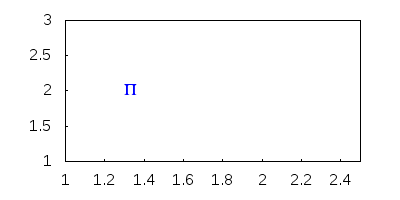
Mathematical expressions in a png file:
draw2d(
terminal = png,
color = black,
explicit(exp(-tau^2/2),tau,0,1),
ylabel = "f({/Symbol t})",
xlabel = "Time, {/Symbol t}",
label(["f({/Symbol t}) = e^{-{/Symbol t}^2/2}",0.3,0.7]) ) $
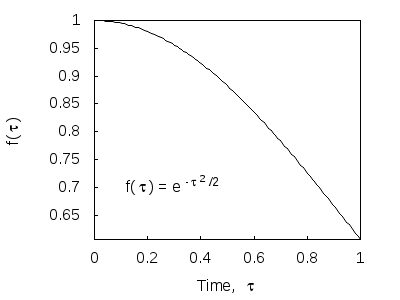
It is possible to write LaTeX code in titles, labels, axes tics and axes labels when working with terminal = epslatex_standalone:
load(distrib) $
/* This code generates two files: maxima_out.tex and maxima_out-inc.eps */
draw(
terminal = epslatex_standalone,
dimensions = 100*[12,8],
gr2d(title = "Standard Gaussian distribution, $\\Phi(x)$",
ylabel = "$\\Phi(x) = \\Pr\\{ X \\leq x\\}$",
xtics = {["$\\longleftarrow -\\infty$", -2.5],
["0",0],
["$x=1$",1]},
grid = true,
line_width = 2,
key = "$\\Phi$",
explicit(cdf_normal(x, 0, 1), x, -3, 3),
label(["$\\Phi(x)=\\int_{-\\infty}^x \\phi(u) du=\\int_{-\\infty}^x \\frac{1}{\\sqrt{2 \\pi}}e^{-\\frac{u^2}{2}}du$",
0, 0.25]),
points_joined = impulses,
color = red,
line_width = 6,
key = "$\\Pr\\{X \\leq 1\\}$",
points([[1, cdf_normal(1, 0, 1)]])),
gr2d(allocation = [[0.1,0.4], [0.5,0.5]],
title = "Gaussian density, $\\phi(x)$",
ytics = {["$\\frac{1}{20}$",5/100],
["$\\frac{4}{20}$",20/100],
["$\\frac{7}{20}$",35/100]},
line_width = 2,
filled_func = true,
fill_color = light_gray,
explicit(pdf_normal(x,0,1),x,-3,1),
filled_func = false,
color = blue,
explicit(pdf_normal(x,0,1),x,-3,3) ) ) $
/* Linux command to generate the plot in dvi format */
system("latex maxima_out.tex") $
/* Linux command to generate the plot in Postscript format */
system("dvips maxima_out.dvi -o") $
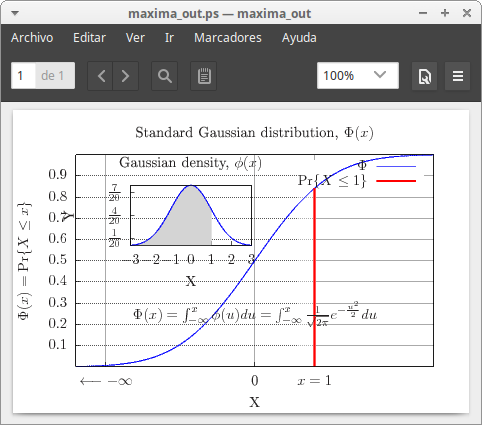
© 2011-2016, TecnoStats.